|
2009.11.13 No.14 |
| |
<Skyrocketing commodity prices and decreasing welfare budgets
make us sad!!> |
|
| |
 On September 30, 2009, right around the corner of the Choosuk holiday, Women’s Action for Decent Lives and Jobs (WADLJ) held 'a women's press conference to demand to increase welfare budget for 2010' in front of the Seoul KTX Station. On September 30, 2009, right around the corner of the Choosuk holiday, Women’s Action for Decent Lives and Jobs (WADLJ) held 'a women's press conference to demand to increase welfare budget for 2010' in front of the Seoul KTX Station.
In spite of the difficult situation in which commodity prices have been rising rapidly and people's daily lives have become harder, a national holiday, Choosuk is around the corner in this year. Recently, the press has reported that Korea is one of the leading groups that overcome the economic crisis and that we have to seek for exits to leap forward. more>> |
|
| |
<Don’t be discouraged because you have struggled for one year.
We have struggled for 25 years. > |
|
| |
 On September 24, 2009, it became a year after 88CC golf caddies started their strike. In front of the Ministry of Patriots and Veterans Affair, golf caddies got together, showing “We want to work,” and women and/or labor activists joined them. The press conference and the struggle resolution rally, organized by Women’s Action for Decent Lives and Jobs (WADLJ) on that day, were to withdraw unfair dismissals of the golf caddies and to demand on their prompt reinstatement. On September 24, 2009, it became a year after 88CC golf caddies started their strike. In front of the Ministry of Patriots and Veterans Affair, golf caddies got together, showing “We want to work,” and women and/or labor activists joined them. The press conference and the struggle resolution rally, organized by Women’s Action for Decent Lives and Jobs (WADLJ) on that day, were to withdraw unfair dismissals of the golf caddies and to demand on their prompt reinstatement.
88 Country Club (88CC), a company entrusted by the Ministry has continued its unfair labor practices suppressing legal golf caddies’ trade union since past June, 2008. In September, 2008, the company dismissed a union member and decided the unlimited job suspensions of 53 unionists. Moreover, the company has dismissed 58 women workers including 3 union executives and decided the unlimited job suspensions of two union members even in 2009. During the past fall, winter, spring, summer, and this fall again, the golf caddies have continued their struggles for their rights to survive so far at the 88CC, in front of the Ministry of Patriots and Veterans Affair, in streets, in the court, and at the labor offices. However, the company and the Ministry of Patriots and Veterans Affair still turn their deaf ears to the women workers. more>>
|
|
| |
<To overcome pains in the era, and overcome the tragedy of the history> |
|
| |
 On past September 21, 2009, the KWWA and Martyr Kim Kyeongsook Commemoration Society in cooperation prepared for the 30th special memorial events for commemorating the Martyr Kim Kyeongsook. The events included a symposium, screening a film in commemoration, simple refreshment to share food of the 1970s, and memorial service, in the order named. On past September 21, 2009, the KWWA and Martyr Kim Kyeongsook Commemoration Society in cooperation prepared for the 30th special memorial events for commemorating the Martyr Kim Kyeongsook. The events included a symposium, screening a film in commemoration, simple refreshment to share food of the 1970s, and memorial service, in the order named.
Kang In-soon, a professor in the Sociology department of the Kyeongnam University had a key presentation entitled women workers of the 1970s and the Korean democratic labor movement. She made a presentation about the necessity for re-assessing the labor movement in the 1970s led by women workers working in the light industry, insisting “today irregular employment is very widely spread, and women workers are the majority of irregular workers in Korea. To take this into consideration, women workers should be the main pillar of the democratic labor movement.” more>> |
|
| |
<30th Memorial Service for Martyr Kim Kyeongsook > |
|
| |
 On past August 11, 30th memorial service for Martyr Kim Kyeongsook was held. In the rainy day, we at the KWWA had the solemn memorial service with YH Association, 70s' Democratic Workers' Association, and activists living in the Seoul metropolitan area. On past August 11, 30th memorial service for Martyr Kim Kyeongsook was held. In the rainy day, we at the KWWA had the solemn memorial service with YH Association, 70s' Democratic Workers' Association, and activists living in the Seoul metropolitan area.
The YH incident (the death of Martyr Kim Kyeongsook) was both major labor incidents with the death of Martyr Cheon Tae-il in the 1970s in Korea. This incident led loss of the seat of the opposition party’s head in the National assembly and then, a democratic movement by the citizens of Pusan and Masan areas, which sparked the termination of the Yushin dictatorial regime.
On September 21, 2009, in celebration of her 30th anniversary, YH Association and KWWA jointly prepared for special events. They included a documentary film for commemorating the Martyr Kim Kyeongsook, which had been prepared for 1 year, a symposium and other memorial services. more>> |
|
| |
<Don’t let them die any more. They’re also ‘humans!’ > |
|
| |
 On an extremely sunny day, July 24, 2009, in front of the National Police Agency, the Women’s Action for Decent Lives and Jobs (WADLJ) held a press conference to tackle the issue peacefully and through communication, after hearing the news that public power will be imminently exercised at the Ssangyong Motor. However, the police surrounded WADLJ activists very tightly and demanded them to hold a press conference in front of the Records Department, instead. In response, mothers from the Minkahyup were so furious because they have held press conferences in front of the main gate so far. We at the WADLJ raised questions why we have to hold a press conference in front of but Records Department not the main gate: and the police attempted to undermine the importance of the issues of Ssangyong Motor’s workers. We had serious argument with the police and finally, we had negotiation with the police and finally held the press conference at the spot in the middle. more>> On an extremely sunny day, July 24, 2009, in front of the National Police Agency, the Women’s Action for Decent Lives and Jobs (WADLJ) held a press conference to tackle the issue peacefully and through communication, after hearing the news that public power will be imminently exercised at the Ssangyong Motor. However, the police surrounded WADLJ activists very tightly and demanded them to hold a press conference in front of the Records Department, instead. In response, mothers from the Minkahyup were so furious because they have held press conferences in front of the main gate so far. We at the WADLJ raised questions why we have to hold a press conference in front of but Records Department not the main gate: and the police attempted to undermine the importance of the issues of Ssangyong Motor’s workers. We had serious argument with the police and finally, we had negotiation with the police and finally held the press conference at the spot in the middle. more>>
|
|
| |
‘Unity, coexistence, and leaping forward!! Powerful executives get together here overnight!’ 2009’s membership training for integrated executives |
|
| |
 Between past July 18 and 19, membership training for integrated executives were held at Seosan, on the title of ‘unity, coexistence, and leaping forward!! Powerful executives get together here overnight!' Up to 160 staff persons from 11 branches and KWWA’s annexed organizations took part in the membership training! You can for sure imagine that their actions and passions can high enough to change their communities and consolidate and strengthen the structures of KWWA. Between past July 18 and 19, membership training for integrated executives were held at Seosan, on the title of ‘unity, coexistence, and leaping forward!! Powerful executives get together here overnight!' Up to 160 staff persons from 11 branches and KWWA’s annexed organizations took part in the membership training! You can for sure imagine that their actions and passions can high enough to change their communities and consolidate and strengthen the structures of KWWA.
The membership training was carried out at the beach for the first time in the herstory of 20 years of the KWWA, in order to overcome barriers of regions and fields and to reinforce our solidarity amongst KWWA’s executives through far better communication and unity.more>>
|
|
 |


 On the past November 16, about our 80 activists and members from our 11 branches nationwide took part in 2011's Photo Expo for Exchanging Hopes at our Hall of Education.
On the past November 16, about our 80 activists and members from our 11 branches nationwide took part in 2011's Photo Expo for Exchanging Hopes at our Hall of Education.  October 18, 2011, Women’s Action for Decent Lives and Jobs (WADLJ) hosted a press conference at the Hall of Discussion belonging to the National Assembly, in order to promote legal reforms regarding “infant-care paternity leave”. In Korea, the only way to encourage males to participate in childcare is to take paternity leave. However, last year, only 819 males used paternity leave since companies are not happy with it and paternity leave is poorly-paid.
October 18, 2011, Women’s Action for Decent Lives and Jobs (WADLJ) hosted a press conference at the Hall of Discussion belonging to the National Assembly, in order to promote legal reforms regarding “infant-care paternity leave”. In Korea, the only way to encourage males to participate in childcare is to take paternity leave. However, last year, only 819 males used paternity leave since companies are not happy with it and paternity leave is poorly-paid. 



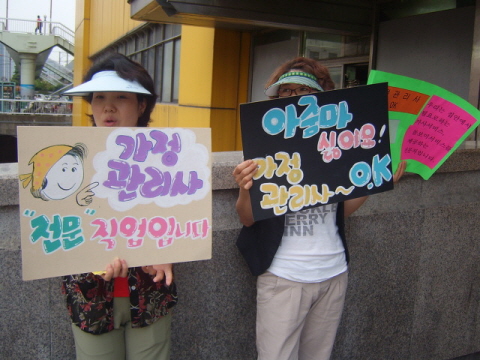 They are housekeeping service workers taking care of housework
and caring which were considered as unpaid work in the family. As a vacuum in
housekeeping and caring at home has been made because of increasing economic
activities of women, the rapid aging of our society, change of the family types,
and so on, they fill up the vacuum. There are 160,000 housekeeping service
workers as of 2007 according to the Economically Active Population Survey of the
National Statistical Office. However, their actual number is probably much more
than 160,000 if we consider the number of housekeeping and caring service
workers in the informal sector which does not show up in statistics.
They are housekeeping service workers taking care of housework
and caring which were considered as unpaid work in the family. As a vacuum in
housekeeping and caring at home has been made because of increasing economic
activities of women, the rapid aging of our society, change of the family types,
and so on, they fill up the vacuum. There are 160,000 housekeeping service
workers as of 2007 according to the Economically Active Population Survey of the
National Statistical Office. However, their actual number is probably much more
than 160,000 if we consider the number of housekeeping and caring service
workers in the informal sector which does not show up in statistics. Women workers spoke out loudly in front of the National
Assembly at Yeouido on June 9 in spite of hot weather. A campaign of women’s
labor groups was organized to gain the minimum hourly wage of 5,180 won for the
year 2010. The Win-Win Women’s Action hosted the campaign and about 100 women
workers from Seoul, Incheon, Daejeon, and Daegu gathered with only a wish of the
raise of the minimum wage.
Women workers spoke out loudly in front of the National
Assembly at Yeouido on June 9 in spite of hot weather. A campaign of women’s
labor groups was organized to gain the minimum hourly wage of 5,180 won for the
year 2010. The Win-Win Women’s Action hosted the campaign and about 100 women
workers from Seoul, Incheon, Daejeon, and Daegu gathered with only a wish of the
raise of the minimum wage. 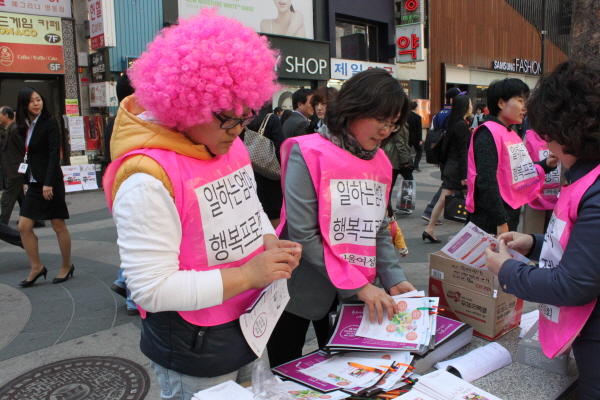 The KWWA and its 11 branches organized a campaign “Project for
Happiness of Working Moms” on the occasion of Equal Employment Week in April.
Every region had a meaningful time to publicize an interrupted career problem
due to triple burdens of pregnancy, childbirth, and childcare with topics of
‘work and care together’ and ‘for the society enabling us to achieve a balance
between work and family,’ and to think its alternatives. Particularly, this
campaign was conducted with unified contents as the KWWA had made promotion
materials such as a parody of the soap opera “Chasing runaway slaves” and a UCC
video clip and distributed them to regions.
The KWWA and its 11 branches organized a campaign “Project for
Happiness of Working Moms” on the occasion of Equal Employment Week in April.
Every region had a meaningful time to publicize an interrupted career problem
due to triple burdens of pregnancy, childbirth, and childcare with topics of
‘work and care together’ and ‘for the society enabling us to achieve a balance
between work and family,’ and to think its alternatives. Particularly, this
campaign was conducted with unified contents as the KWWA had made promotion
materials such as a parody of the soap opera “Chasing runaway slaves” and a UCC
video clip and distributed them to regions. 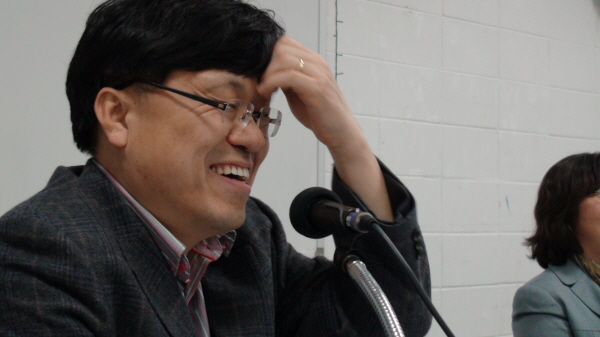 The 1st Women Labor Forum: what will we do
regarding local and educational autonomy?
The 1st Women Labor Forum: what will we do
regarding local and educational autonomy? 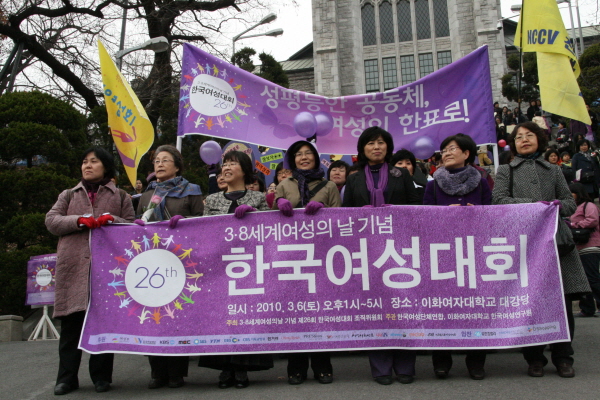 The convention was held under the theme of
“make our hope real with women’s participation” in the auditorium of Ewha Womans
University on March 6.
The convention was held under the theme of
“make our hope real with women’s participation” in the auditorium of Ewha Womans
University on March 6. 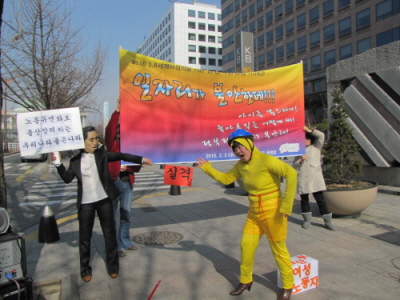 The press conference was held by “the
Win-Win Women’s Action to save the people’s livelihood and jobs” in front of the
National Assembly at Yeouido at 11:00 on March 3 in commemoration of the
International Women’s Day. It urged the job security of women with the topic of
“unstable jobs”.
The press conference was held by “the
Win-Win Women’s Action to save the people’s livelihood and jobs” in front of the
National Assembly at Yeouido at 11:00 on March 3 in commemoration of the
International Women’s Day. It urged the job security of women with the topic of
“unstable jobs”. 
